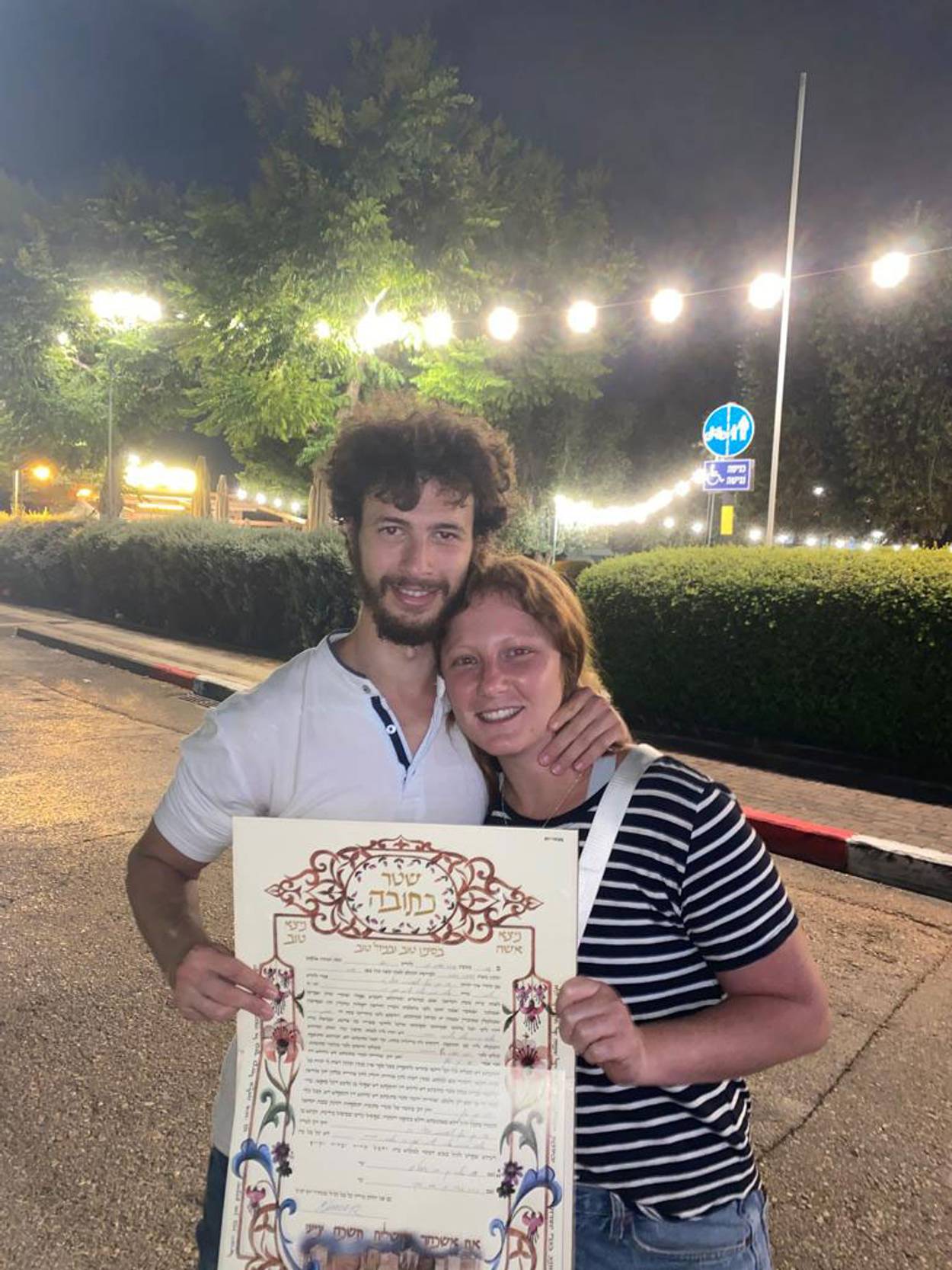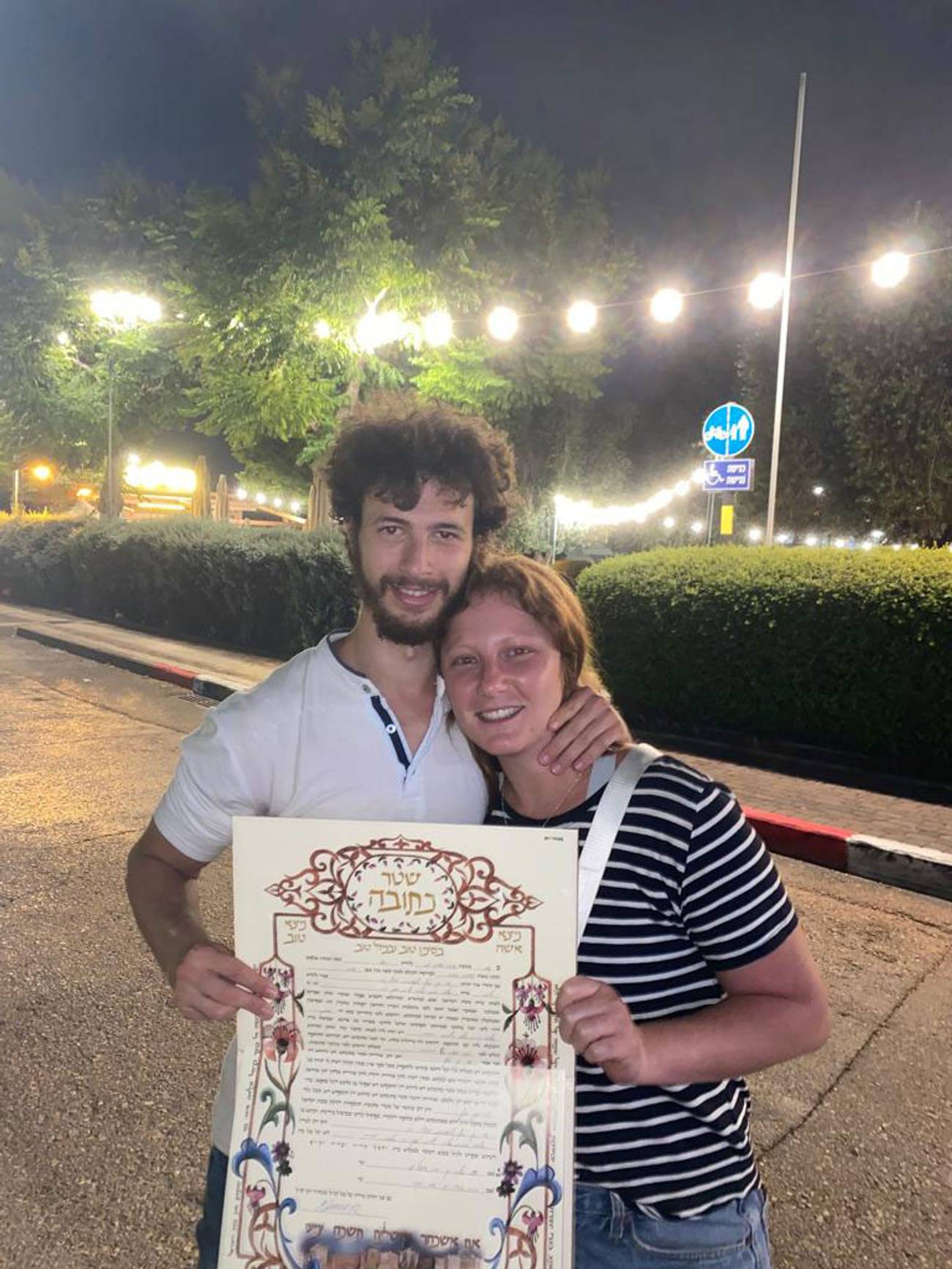Last Sunday, Hadas Gabay and Eliran Lanzer stooped beneath a lemon tree’s branches and, to the bride’s mother Tamar’s vocal rendition of Arik Einstein’s “Love at First Sight,” walked hand-in-hand down a white carpet and into matrimony.
Only 14 guests were there—in Gabay’s parents’ backyard in Shoham, a town of about 20,000 in central Israel—to witness the small wedding ceremony at 3:30 in the afternoon, and to enjoy refreshments on the patio and a light meal at the dining room table. It was hardly the gala for 500 people the couple had planned for Sunday night at a catering hall.
The radical downsizing complied with the home front’s crowd restrictions following Hamas’ October 7 massacre of Israelis near the southern coast, as the Israel Defense Forces prepare to enter the Gaza Strip intent on wiping out the terrorist organization governing the enclave.
So the couple winged it. A friend styled the bride’s hair. Gabay’s sister snapped photographs. They rented a chuppah.
Given the circumstances, “we aren’t inclined to do a big event,” Gabay had explained by phone two days earlier. “We all know people serving in the IDF and who were killed. It’s hard to celebrate, to do a big event now.”
Even a downsized wedding, she said, “shows that life continues.”
“It’s not the wedding you imagined,” the officiating rabbi, David Stav, told the couple under the chuppah. “Please God, there will be time to celebrate in a larger manner.”
The Lanzers plan to do so with their full complement of invitees after calm returns.
They are hardly alone among couples whose dream weddings have met security realities and somber moods in a country where grooms- and brides-to-be are pressed into reserve duty, with many dispatched to the tense northern and southern borders.
Couples countrywide postponed their weddings indefinitely, advanced them or, like the Lanzers, kept the date but shifted venues. Some without plans to marry decided, in the concentrated vision wrought by the national crisis, to hitch their wagons in sorrow and in joy. Still others arranged quickie weddings on military bases in the few hours allotted to them and without even parents as witnesses.
The Bible exempts from battle newlyweds, along with men planting vineyards, and those building their homes—but that applies only to wars of choice. In defensive wars, such as the current one, everyone is a soldier, Stav—Shoham’s chief rabbi and the chairman of Tzohar, an organization of Orthodox rabbis seeking to bridge the observant-secular divide—explained by phone.
In a vacuum, weddings are not delayed “because it’s a mitzvah to marry and establish a family”; on the other hand, celebrations should be avoided during grim periods for the Jewish people, he said.
Stav, who’s performed four weddings during the crisis, and whose four sons and three sons-in-law were called into reserve duty, said Israel’s rabbinate takes a hands-off approach and defers to each couple’s judgment: “There’s a tension within Halacha, so the rabbis feel that it’s best to leave it to the couple. Generally, we don’t interfere on this matter.”
Alec Burkin and Danielle Haliva postponed their wedding.
The 230 guests planning to attend their October 12 ceremony included 120 from abroad, 50 of whom had already reached Israel before the Hamas attack.
On the morning of October 7, the couple awoke in their Jaffa apartment to news of the invasion. They saw the video clips of murder and shooting and kidnapping. A few hours later, they and many of the travelers gathered at the Tel Aviv apartment Burkin’s father rented. Burkin and Haliva didn’t want anyone to be endangered.
They slept on the decision, and, the next morning, postponed the wedding and told everyone to fly home.
“I started to mourn the loss of the wedding,” said Burkin, a Boston native. “I thought it would be irresponsible [to hold the wedding]. I didn’t want our wedding plans to influence people’s safety. I felt passionately about that. I don’t think anyone was surprised. They were sad and shifted quickly to getting out of the country. That was a relief to me.”
By the end of the week, all the foreigners had departed, most for Turkey and Greece before finding their way home.
While disappointed, Burkin said a ceremony merely formalizes his and Haliva’s five-year relationship. They’ll reschedule when the time is right.
“The most difficult thing to stomach,” Burkin said, was being unable to expose “the beauty of Israel” to the foreigners, some of whom had never visited the country.
“We don’t feel like we need the validation of any governmental or religious body telling us we’re married. We feel very much married and will do everything we can to make the initial goals of the wedding come true in the future,” he said. “There’s still a desire to do something, to celebrate in some capacity. It’s hard not to imagine celebrating our love publicly.”
Ori Minzer and Elinor Yossfin held their wedding—on the fly, without even having been engaged.
The couple was vacationing on a boat near Ko Phi Phi, an island in Thailand, when they learned of Hamas’ massacre.
Both received texts summoning them to reserve duty. They took a ferry and a plane to Bangkok, boarded a 10-hour flight to Israel, landed at 7:30 p.m. on October 8, and were driven the six miles to Shoham.
By 9:30 p.m., on the town hall’s lawn, with their parents and Yossfin’s sister their only loved ones present, they were married.
They’d discussed marriage during their seven-month courtship, but Minzer hadn’t yet proposed. He’s the romantic one, Yossfin said. She’s the practical one, and wanted her legal status cemented should anything befall Minzer, who’s now based near Gaza.
“He’s a combat soldier, so I think we all know what that means,” Yossfin said by telephone at noon on Monday, October 23.
Rabbi Stav married off this couple, too; 20 youths to whom he’d spread the word brought a chuppah and the two official witnesses required for a Jewish wedding. The couple borrowed relatives’ rings for the ceremony. Afterward, the seven family members in attendance sat on the grass, munching on two store-bought cakes: one red, one white.
The ceremony was recorded and posted online, and the comedian Hanoch Daum shared it on Facebook. When the couple returned to their Tel Aviv apartment, friends lit up their phones with congratulations because Daum’s share went viral.
The new husband and wife still wore what they had on in Thailand and at their improvised wedding: Minzer was in jeans, a white polo shirt, and sneakers; Yossfin was in shorts, a striped shirt, and sandals. In famously informal Israel, they’d lowered the wedding-fashion bar still further.
“We came from the flight tattered and tired,” Yossfin said, chuckling.
“The [wedding] was not at all how we imagined it. It’s not at all how I wanted it to be. We were also very nervous, because we didn’t know what will be. Ori said romantic things. I didn’t know what to say. I said, ‘Thank you,’” she said. “We decided it’s for the best. People said it’s nice to have good news in these difficult times.”
With that, she cut our interview short to visit Minzer for two hours in the town of Kiryat Malachi. Minzer had just called to say his unit would briefly be there. Before calling, he sent her a bouquet of flowers.
Yossfin left to see him, bringing along two wedding rings she’d just purchased.
“We’re connected now,” she said.
Amitai Zvi Granot and his fiancée, Roni Levinson, planned to marry next February. But he called her at 2 a.m. on October 15, from near where he served along Israel’s border with Lebanon. During their two-hour conversation, he pushed for their wedding to take place during his next leave, advancing the date because of Israel’s security crisis. She agreed.
But the wedding will never be. Granot, a lieutenant in the tank corps and a platoon leader, was killed by Hezbollah terrorists just hours after their phone conversation, in a battle at Moshav Shtula. Rabbi Tamir Granot said his son was “24 years and 4 months old.”
The couple had met four months earlier. On Sunday, October 1, they attended an engagement party hosted by Levinson’s family near Haifa. Granot then returned to his tank unit. Hezbollah soon launched missiles from Lebanon into northern Israel in a bid to open a second front in the war.
Only after his son’s death did Rabbi Granot learn that he fought terrorists much of his last days alive, killing several squads seeking to enter Israel.
“He was very modest and he also didn’t want to worry us,” Rabbi Granot said.
As a boy, his son loved nature. He and his wife, Avivit, joked that “he did his degree in canals and [water] springs,” Rabbi Granot said. While not studious early on, he greatly respected his teachers, even to his detriment.
Following high school, Granot came into his own at a yeshiva in Beit Shean. Friends told of admiring his empathy and gentle nature, and also his leadership skills—“a quiet charisma,” Rabbi Granot said. When his son returned home for weekend leaves from the military, he’d kiss both parents, then, forsaking proffered food, would stride to the piano and fold his 6-foot-3 frame onto the bench to play and sing.
“You’d see the strength of a fighter and a Jewish gentleness. It was in harmony,” his father said. “This was a boy who’d filled out, who was about to be married, poised to produce [for us] a grandson or granddaughter, to establish a household. This pains me terribly. It’s hard to describe. I have so much appreciation and respect for my beloved son.”

